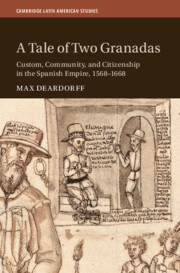6 results
4 - Controlling Dissent and Imposing Authority
-
- Book:
- Global Servants of the Spanish King
- Published online:
- 20 February 2025
- Print publication:
- 27 February 2025, pp 166-202
-
- Chapter
- Export citation

A Tale of Two Granadas
- Custom, Community, and Citizenship in the Spanish Empire, 1568–1668
-
- Published online:
- 27 July 2023
- Print publication:
- 10 August 2023
28 - Refugees in Europe and the Atlantic World
- from Part X - Refugees
-
-
- Book:
- The Cambridge History of Global Migrations
- Published online:
- 12 May 2023
- Print publication:
- 01 June 2023, pp 549-563
-
- Chapter
- Export citation
30 - Refugees in Africa, 1490–1820
- from Part X - Refugees
-
-
- Book:
- The Cambridge History of Global Migrations
- Published online:
- 12 May 2023
- Print publication:
- 01 June 2023, pp 583-600
-
- Chapter
- Export citation
Part III - A Fraying Fabric
-
- Book:
- The Mexican Mission
- Published online:
- 13 June 2019
- Print publication:
- 27 June 2019, pp 197-256
-
- Chapter
- Export citation
8 - Epilogue
- from Part III - A Fraying Fabric
-
- Book:
- The Mexican Mission
- Published online:
- 13 June 2019
- Print publication:
- 27 June 2019, pp 247-256
-
- Chapter
- Export citation

